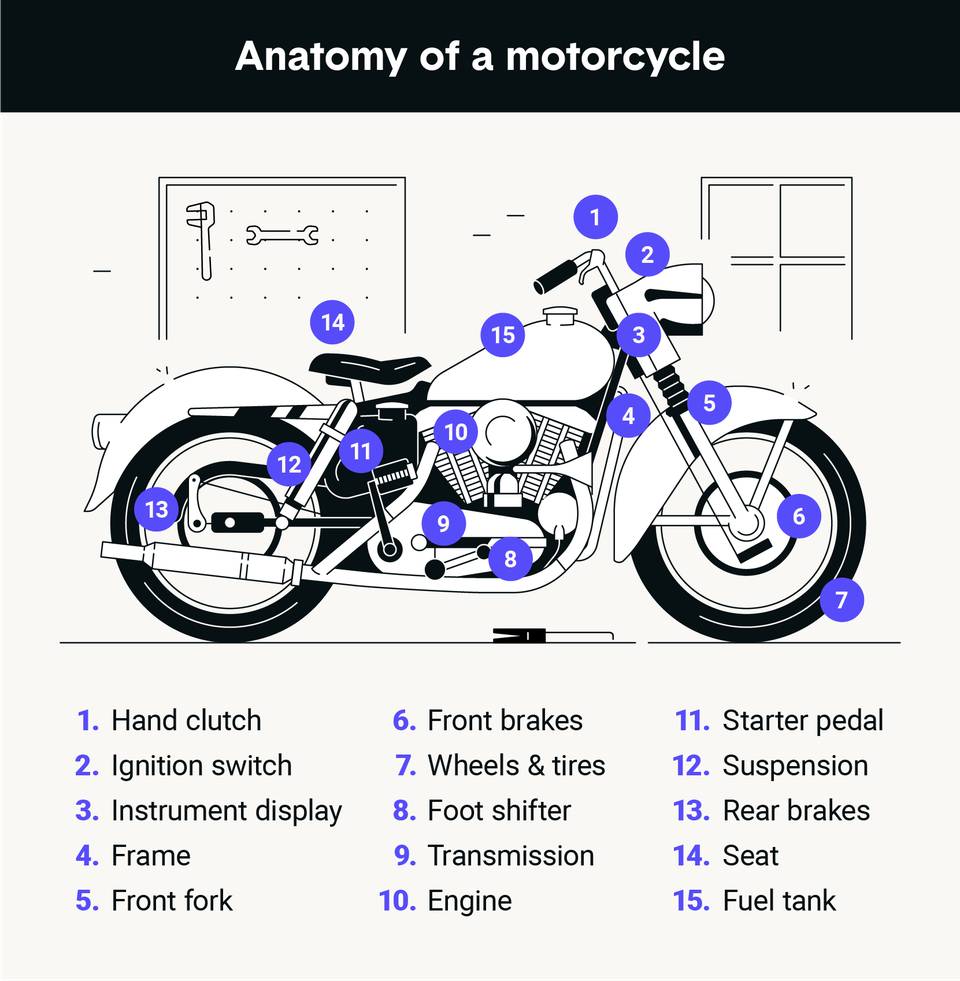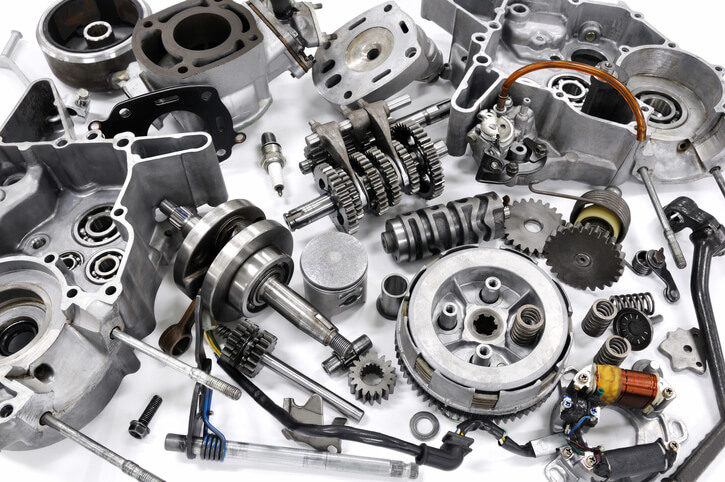Why Riders Trust Only Dealer-Certified OEM Parts New Zealand for Long-Term Value
Why Riders Trust Only Dealer-Certified OEM Parts New Zealand for Long-Term Value
Blog Article
Discover the Necessary Motorcycle Parts You Need for Ideal Performance
Understanding the important parts of a motorcycle is fundamental for achieving peak performance. Each element, from the engine to the stopping system, plays a crucial role in overall performance and safety. Regular upkeep can prevent unexpected failures and enhance the riding experience. Several bikers neglect the details of these systems. Finding just how they function with each other can result in a more reliable adventure. What crucial elements should every biker focus on?
The Engine: The Heart of Your Motorcycle
The engine works as the core part of a motorbike, driving its efficiency and specifying its capacities. It is accountable for converting fuel into mechanical energy, which powers the bike onward. Different kinds of engines are used, including single-cylinder, V-twin, and inline arrangements, each offering distinct features matched for various riding purposes and designs. The engine dimension, generally determined in cubic centimeters (cc), substantially affects performance, with bigger engines generally giving more power and torque.Furthermore, the engine's style and technology, such as fuel injection systems or air-cooling versus liquid-cooling, affect effectiveness and integrity. Upkeep is vital for peak procedure; variables like regular oil adjustments and checking ignition system assurance long life. Cyclists often think about an engine's responsiveness and smoothness, as these features improve the general riding experience. Eventually, the engine continues to be a critical element that defines not only the motorcycle's efficiency but also the motorcyclist's link to the machine.
The Transmission: Shifting Gears Smoothly
The transmission plays a necessary duty in a motorbike's performance, specifically in the auto mechanics of gear changing. Comprehending just how to change gears efficiently can boost the general riding experience, while normal upkeep assurances peak capability. Correct interest to these aspects can substantially affect the long life and performance of the motorcycle.

Equipment Shifting Mechanics
Smooth equipment changing is essential for excellent motorbike performance, substantially impacting both acceleration and control. The auto mechanics of gear moving include the communication in between the clutch, gear lever, and transmission system. When a biker involves the clutch, it disengages the engine from the transmission, permitting an equipment modification without harming the components. A well-timed release of the clutch, incorporated with exact activity of the gear lever, helps with a seamless modification in between gears. This procedure ensures that the engine operates within its finest power band, boosting performance. Bike Parts Wellington. In addition, understanding the equipment ratios and their result on speed and torque can aid riders make notified selections throughout shifts, inevitably adding to an extra responsive and pleasurable riding experience
Maintenance Tips Value
Routine maintenance plays a crucial role in guaranteeing that the transmission system operates successfully, allowing for smooth equipment changes. Consistently examining and changing the transmission fluid is essential, as old fluid can bring about increased rubbing and wear. Additionally, inspecting the clutch for wear assurances peak engagement and disengagement, protecting against slippage during gear changes. Lubrication of moving parts is just as crucial to reduce friction and enhance performance. Motorcycle proprietors need to also keep track of for leaks and unusual noises, as these can show underlying issues. By sticking to these maintenance ideas, motorcyclists can lengthen the life-span of their transmission system, assuring that equipment changes remain smooth and contributing to the overall efficiency of their motorbike.
The Braking System: Ensuring Safety on Every Ride
Braking systems are essential elements that directly affect a motorcycle's security and efficiency. They include different parts, consisting of brake pads, rotors, calipers, and hydraulic lines, all collaborating to assure efficient slowdown. The sort of braking system-- commonly either disc or drum-- influences responsiveness and quiting power.Regular upkeep is necessary to maintain peak efficiency; worn brake pads can cause decreased performance and raised quiting distances. In addition, the high quality of brake liquid need to be kept track of, as it can take in dampness gradually, endangering stopping efficiency.Riders ought to also consider the relevance of anti-lock braking systems (ABDOMINAL), which avoid wheel lockup throughout abrupt stops, boosting overall safety and security. Effectively operating brakes are not simply regarding quiting; they impart self-confidence in the cyclist, enabling much safer navigation through various terrains. Eventually, a dependable braking system is essential for appreciating every trip with assurance.
The Suspension: Enhancing Convenience and Control
A well-functioning suspension system significantly contributes to a motorbike's general performance, enhancing the efficiency of the stopping system. The suspension plays a considerable role in absorbing shocks from uneven surfaces, ensuring a smoother trip while maintaining tire call with the roadway. This get in touch with is essential for both stability and control, enabling cyclists to navigate edges with self-confidence and precision.Different sorts of shock absorber, such as telescopic forks or mono-shocks, offer differing levels of comfort and handling. Properly tuned suspension enhances responsiveness, supplying the cyclist with a more linked feeling to the motorbike. Routine maintenance checks are important to identify the suspension parts, including dampers and springs, are operating at their finest. An efficient shock absorber not just elevates the riding experience yet additionally adds to the durability of other motorcycle parts by decreasing damage. Because of this, purchasing high quality suspension is vital for any kind of major motorcycle enthusiast.
The Tires: Connecting You to the Roadway
Tires play an important duty in a motorcycle's performance, acting as the key web link between the cyclist and the roadway. Understanding the various kinds of tires readily available can considerably affect taking care of and safety and security. Additionally, routine maintenance is essential to guarantee peak tire performance and long life.
Tire Enters Explained
Just how do various tire types influence a motorbike's efficiency? Tire kinds play an important duty in identifying a motorcycle's hold, stability, and handling. Sport tires, created for high efficiency, deal boosted grip and responsiveness on smooth roads, making them excellent for racing and hostile riding. Alternatively, visiting tires prioritize longevity and comfort, supplying a smoother experience for long-distance travel. Off-road tires, identified by their rugged walk patterns, master traction on unpaved surface areas, suitable for experience fanatics. In addition, dual-sport tires mix qualities from both on-road and off-road classifications, catering to flexible riding demands. Eventually, picking the right tire kind is important for enhancing performance, ensuring safety, and enhancing the overall riding experience.
Maintenance Tips Offered
While riding when traveling, maintaining suitable tire condition is vital for security and efficiency. Routinely examining tire stress is necessary, as under-inflated tires can result in poor handling and boosted wear. It is advisable to evaluate step depth frequently; worn tires compromise grip and security. Additionally, riders ought to search for indications of damage, such as lumps or splits, which can show the demand for replacement. Turning tires occasionally ensures even use, boosting durability. Maintaining tires tidy from particles and staying clear of excessive More about the author aesthetics can lengthen their lifespan. Preserving proper alignment and equilibrium contributes to peak performance, decreasing anxiety on other bike parts. Following these maintenance tips will substantially enhance the total riding experience.
The Gas System: Fueling Performance and Performance
The fuel system plays an essential function in making the most of a motorbike's efficiency and efficiency, as it guarantees the ideal distribution of gas to the engine. It comprises a number of critical parts, consisting of the gas storage tank, fuel pump, fuel filter, and fuel injectors or carburetor. Each part must function effectively to ensure a smooth and powerful ride.The gas storage tank shops gasoline and supplies it to the engine using the gas pump, which generates the required stress. A fuel filter protects against pollutants from going into the engine, while the injectors or carburetor mix gas with air for combustion.Proper upkeep of the fuel system is essential; a stopped up filter or malfunctioning injector can lead to decreased efficiency and boosted fuel usage. By validating that the fuel system runs efficiently, cyclists can appreciate improved throttle action, better gas economic climate, and generally enhanced riding experience.
The Electric System: Powering Your Adventure
An effective electric system is important for the overall capability and security of a motorcycle, as it powers critical components such as the ignition, lighting, and numerous electronic systems. This system consists of the battery, which shops energy, and the check over here generator, accountable for creating power while the engine runs. The circuitry harness attaches these components, making certain dependable power distribution.Additionally, fuses secure the system from overloads, while relays assist regulate high-current gadgets with low-power signals. A properly maintained electrical system improves performance by guaranteeing smooth beginnings and consistent operation of signals and lights, vital for rider presence and safety.Regular checks of the battery's charge and links are necessary for preventing electrical failures. Bikers need to also evaluate electrical wiring for damage, ensuring all elements operate preferably. Inevitably, a durable electrical system contributes significantly to the total efficiency and reliability of the motorbike.
Frequently Asked Concerns
Just how Typically Should I Change My Motorcycle's Battery?
The frequency of motorcycle battery substitute relies on use and upkeep (Bike Parts Wellington). Usually, batteries should be changed every 3 to five years. Regular checks can aid recognize when a replacement is needed for peak performance
What Tools Do I Need for Fundamental Motorbike Upkeep?
For standard motorcycle upkeep, one requires essential tools such as an outlet collection, wrenches, screwdrivers, pliers, tire pressure gauge, and a torque wrench. These devices assist in effective upkeep and assure the motorbike runs effectively and securely.
Exactly How Can I Enhance My Motorbike's Aerodynamics?
To improve motorcycle aerodynamics, one ought to think about readjusting fairings, making use of windshield expansions, optimizing body setting, and lowering overall weight. These adjustments help lessen drag, boosting stability and fuel efficiency during rides.
What Are the Indicators of a Failing Electrical System?
Signs of a stopping working electric system include lowering lights, trouble beginning, uneven instrument readings, and blown merges. Oem Parts New Zealand. Uncommon scents or corrosion around battery terminals may also indicate underlying problems requiring instant interest for safety and security and performance

Just how Do I Pick the Right Oil for My Bike?
When picking oil for a motorcycle, one should consider the manufacturer's specs, thickness rankings, and the sort of riding. In addition, traditional versus synthetic oil can impact performance and engine defense, influencing the choice considerably. The engine dimension, commonly measured in cubic centimeters (cc), considerably affects performance, with try this site larger engines typically supplying more power and torque.Furthermore, the engine's style and technology, such as gas shot systems or air-cooling versus liquid-cooling, impact performance and integrity. A well-functioning suspension system greatly contributes to a motorbike's overall efficiency, matching the performance of the braking system. The fuel system plays an essential duty in taking full advantage of a motorbike's performance and effectiveness, as it ensures the ideal distribution of gas to the engine. A fuel filter protects against pollutants from going into the engine, while the injectors or carburetor mix gas with air for combustion.Proper upkeep of the fuel system is important; a stopped up filter or malfunctioning injector can lead to lowered efficiency and raised gas consumption. A well-maintained electrical system boosts performance by ensuring smooth beginnings and constant operation of lights and signals, essential for cyclist exposure and safety.Regular checks of the battery's fee and connections are vital for avoiding electrical failures.
Report this page